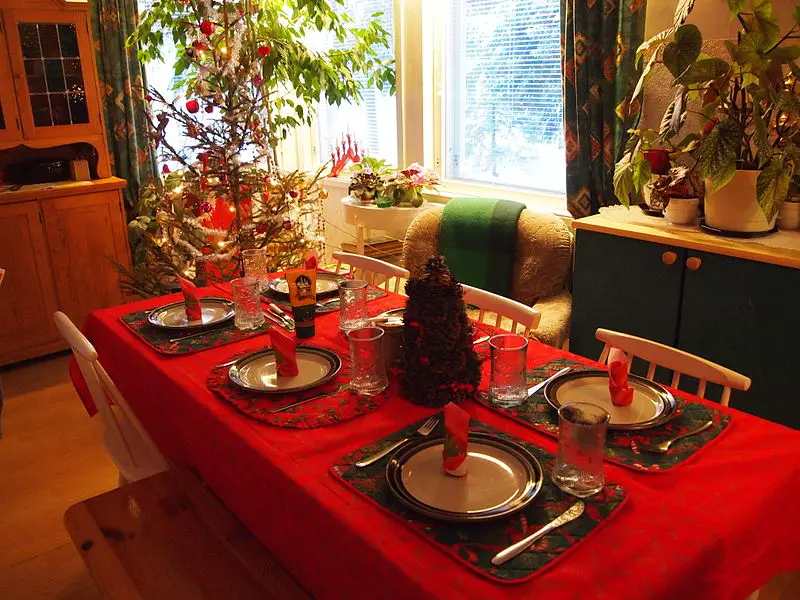OnTheWight’s weekly colummist, Jonathan Dodd, shares this last Christmas story. Ed
The snow was crisp and even. The night was silent. Nothing was stirring, not even a mouse. This night was the very epitome of the perfect Christmas Eve, and it didn’t make the slightest difference. Jenny was staring out of her perfectly-insulating double-glazed windows, in her special Christmas jumper with reindeer on, sipping white wine, and the night was staring back. The tree was lit, there were presents ready to be torn open, the fridge was full, there was even a fire, although it was only glowing on her high-res screen, and the central heating was taking good care to keep her toasty-warm. But there was something missing, and she didn’t know what to do about it.
“There are no Christmas songs for when you’re on your own,” she thought. To herself. “At least I’m not talking to myself yet. I suppose that should help, but it doesn’t.” She glared at the mistletoe hanging hopefully from the lampshade. The mistletoe wisely kept silent.
“What am I going to do?” She sighed. She knew very well what she was going to do. She was going to go to bed at a sensible time, on her own. Then she would get up in the morning, go out in the car to fetch her parents, and her Gran, and her last Aunt, and Trevor, and she was going to bring them all back to the house. And she was going to cook, and pour drinks, and wash up, and keep up a lively chatter about anything they wanted to talk about, and they would watch all their favourite Christmas programmes while she prepared more food, and washed up again, and she would have to be careful not to drink much herself, because she would have to take them all back to their homes.
They would all tell her what a lovely time they had, and thank her for their presents, and all the lovely food, and they would give her a peck on the cheek or a careful hug, and thank her again, and she would tell them how much she enjoyed having them round, and she would wish them all a Happy Christmas, again. And then she would drive back home, on her own, and sit down on her settee, utterly exhausted. And then she would go to sleep, and there would be nothing to do the next day apart from clear up and wonder about what the point of it all was.
And she would feel guilty, because she had a good life, and a good job, and she had her own home, and enough money, and comfort, and so many other good things. And then she would feel angry. And then she would feel guilty about feeling angry, and so it would go, round and round. And she could see no end to it. And when she was older, there would be nobody to fetch her, and sit her down on their settee, and feed her, and give her presents, and tell her that they loved her. And she ached for that. Not the being old and being remembered, but the being loved. How can you be grateful when you have so many things, but you’d swap all of them for the one thing you really wanted?
Jenny decided that gratitude isn’t all it’s cracked up to be, and went to bed.
The next morning was bright and crisp again. There were children out already, building snowmen and throwing snowballs, their excited cries piercing her ears as she got the car out. She fetched her parents and her Gran, as she usually did, brought them back and settled them on the settee. She kept up a stream of happy conversation in what felt to her was a demented way, but they didn’t notice. Perhaps they thought she was always like that. Then she took the car out again to fetch Aunt May and Trevor. She didn’t hurry.
Aunt May was a large woman who lived in sheltered accommodation and never grumbled. That’s what she said all the time, in the midst of a constant stream of grumbling. Jenny had worked out years ago that she was just sad and lonely, and she had never been married or had children, so it was a case of “There but for the grace of God, go I.’ Not that God had anything to do with it, she thought. May was hard work, at least until the third drink, and then you had to keep her away from the rest of the bottle.
Trevor was a bit of a mystery, because he was officially part of the family, but Jenny never somehow found out where he came from or who was responsible for him. Jenny’s family was old-fashioned, and they just didn’t talk about things they didn’t want to. He also lived in a house where he got a lot of support. He was slow, and he would never work, but he was gentle, and he had the loveliest open face you could ever wish to gaze upon. He was just goodness and innocence incarnate, and he always sat on a stool near the window, watching the birds in the garden and eating everything that was put in front of him. Jenny had a huge soft spot for him.
When she rang the doorbell, an unfamiliar man opened the door.
“Are you Jenny? Please come in. My name is Naim. Trevor is putting his coat on. He took a long time wrapping his presents. I’m sorry that he is not ready.” He smiled at her, and she noticed that he was foreign-looking, and then she noticed his white teeth lighting up his brown skin. He seemed to be about the same age as her, with signs of grey hair starting to show against the glossy black of his hair. Apart from Trevor struggling into his coat upstairs, the house seemed rather quiet.
“Everyone has gone out, to family or friends. This is good.” He was obviously pleased.
Jenny thought she should speak. “How about you? Can I give you a lift?”
“Ah no! I am working here. I shall stay until they come back this evening.”
“But this is Christmas. You can’t stay on your own!” And Jenny found herself doing something she had never thought she would. “Come and spend Christmas with us!”
Naim’s eyes narrowed. “Do you mean this? I am not…” But Trevor had arrived, unusually quietly, and a big happy grin was splitting his face. “Oh yes! Can Naim come? He’s my friend!” Jenny and Naim both looked at Trevor, then at each other, and they both started to shrug at the same time, which made them smile.
“Now you’ve been invited twice, so you’ve got to come. Not that it’s very exciting.” Jenny’s mind was picturing her home for the next few hours, with all the usual suspects, and Naim.
“I hope we can find you things to eat,” she said, and felt stupid.
“Thank you. I eat anything,” said Naim, fetching his coat. Jenny couldn’t help wondering how it would work out. And then she decided it would do them all good
It turned out that Naim was no trouble at all. He drank from his glass of water, and spent his time talking to everyone, and he knew a lot of games. Trevor kept asking for them, and the oldies joined in. Jenny was surprised, standing in the doorway, to see them all laughing and talking animatedly as they took their turns to play. She was able to get on with the food, without being constantly interrupted. Naim even took it upon himself to keep them supplied with drinks and nibbles, and she noticed that he never let anyone, particularly Trevor, stuff themselves. He even managed to lay the table in between journeys for more drinks, and made sure she was supplied with a drink herself. She was very grateful, and the cooking turned into a pleasure instead of a thankless task.
Naim turned out to be an expert carver too, and helped with the serving and collecting. After dinner, Jenny was able to slip away to wrap an extra present and sign an extra card. And while everyone was opening their presents she quietly handed these to Naim, who accepted them with grace, and put the festive scarf round his neck with an expression of great contentment. He put his hands together and bowed at Jenny, whilst looking into her eyes, and she found herself making the same gesture back. It felt good.
After the presents, Jenny settled everyone in front of the television for the Queen and some old film. When she retreated to the kitchen, Naim followed her in, rolling up his sleeves. He insisted on washing up, and drying, and putting away, making her sit with a drink, and they talked. He answered her embarrassed questions about where he was from, why he had come to England, and what he thought about his job. He answered everything briefly, but she had an understanding that there was a lot more, that he wasn’t going to tell her. At least not yet. And she answered his questions. They found themselves comfortable together.
“And what do you think of our Christmas? It must seem strange to you.”
Naim waved a wet wooden spoon about, trying to force his thoughts into his not-yet-familiar English. “I am not a Christian, and I think this Christianity is not so important in your country. In my country we like your stories, and we know the story that you call Christmas. But it is different.”
All the time he was steadily washing and drying, and Jenny was listening, and watching him.
“In my country we like this story, about the baby born with nothing, and then saved from being killed, like all the other babies. We understand this well. But we don’t have three kings. We have four. The first three bring rich gifts. These are not important. The fourth king brings no gift, but he brings his heart. He finds food, and blankets, and helps with the journey, and the escape.” And here he became silent, his hands hidden in the hot soapy water, and stared intently out of the window.
Jenny sighed. “They escaped, as you did.” He nodded, and looked back at her. “And now you’ve come, like a fourth king, to my house. I hope you come again.”
Naim laughed then, his great grin spreading across his face, mixing with his pain.
“Jenny, I would like that very much.”
And he raised a foamy wine glass at her, she raised her wine-filled glass at him, and they mock-toasted each other.
Image: Miia Ranta under CC BY 2.0





